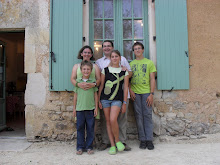Nina was still doing badly at school. Jacques said it was my fault for socialising too much and reading while snuggling in bed with her. I accused him of never reading bedtime stories to her, as all good English parents do. We clashed culturally on what to do with our non-reader. I wanted a tutor while Jacques proposed seeing a psychologist. This sent me into a fury “She’s not mentally sick,” I screamed, while he calmly told me he had seen a psychologist when at school. ‘You never told me!’ I said, but apparently it was quite normal since he refused to work and said he hated his mother. For an English kid to see a psychotherapist is asking for social exclusion (no more birthday invites…) and I didn’t want Nina on Ritalin.
But after an informal chat with her teacher I was persuaded to try out a session. The resident school psychologist was a charming young French woman married to an American and she totally approved of bilingualism. We discussed the French-accent-when-she-spoke-English issue, Nina’s problems with friends and her decision to play dunce. She said she would interview and observe Nina and get back to us. I had a few sleepless nights worrying about her. What had we done to her? Was it the overload of languages, the expat life, the lack of extended family, having a maid or leaving her alone too much?
But in the end it was very simple. Nina was ‘stuck’ in maternelle, where she had spent three happy years, with delightful teachers, loving friends and a reassuring routine of singing, dancing and creative work. Now she had lost her girlfriends and was asked to sit still (the teacher said she was very twitchy) and do academic work in a very structured environment. Nina's reaction was to try to revert back to maternelle. So as parents we had to encourage her to ‘grow up’ and not treat her as a princess. She loved to dress up as a princess and did enjoy being the only female in the threesome.
The psychologist concluded that the French accent was just her way of fitting in with the French kids and said we should let it go. Nina had said that she felt ‘more French’ but she thought that was normal in a Francophone school.
Nina had to learn to make friends in a more sophisticated way and adapt to their ways. The psychologist told me that between age 7 and 9 is a very intense time for a girl and they need a ‘best friend’, to reflect their changes and assure them they are worth something, almost like a love affair. They must go through it before they reach puberty and fall in love with boys. This startled me, but it made sense and so we looked at Nina with a new view.
I think the reason she did not click with the girls was because she came over as quite immature, which I had put down to her not having much cultural input like MTV or pop music. But she needed to change or she risked being teased for being a baby. I had been proud to have kept Nina away from Britney Spears, pink iPods, Bratz dolls and wearing sexy clothes but we couldn’t keep her as a cute little girl forever, no matter how much we wanted to.
Subscribe to:
Post Comments (Atom)



No comments:
Post a Comment